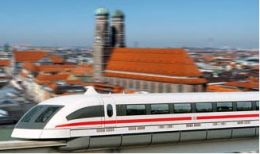Posted 17th April 2008 | 2 Comments
Germany scraps maglev airport link

An impression of how a Transrapid maglev train would have looked in Munich
Plans for a magnetic levitation rail link between Munich airport and city centre have collapsed due to soaring costs, ending Bavarian dreams of hosting Europe's first commercial application of the high-speed technology developed by Germany’s Siemens company.
The decision leaves Shanghai, China, as the only city operating a Transrapid maglev link — between Pudong International Airport and the Lujiazui financial district — at over 500 km/h (310 mph), since 2002.
Munich’s project, a collaboration between Siemens AG, ThyssenKrupp AG and Deutsche Bahn AG, was only given the go-ahead after years of debate in September 2007. The then Bavarian state premier, Edmund Stoiber, said he had persuaded a group of investors to bridge a funding gap, hailing the project as a “beacon'' for German technology.
The German government had agreed to bear half the cost for the line, but up to a maximum of only 925 million euros. The state of Bavaria had earmarked 500 million euros — with German state railways Deutsche Bahn, the airport, the European Union and the two other companies involved making up the remainder.
But Transport Minister Wolfgang Tiefensee in Berlin said the cost is now estimated to have almost doubled from an original estimate of 1.85 billion euros to 3.4 billion euros ($5.4bn, £2.7bn).
The Transrapid project would have reduced the current 40-minute journey from Munich to the airport to only 10 minutes.
Dr Michael Kerkloh, chief executive of the Munich Airport operating company, expressed deep regret at the decision by the Berlin federal government not to build the maglev rail link.
And with no evident market for Transrapid in Germany itself or the rest of Europe, Transport Minister Tiefensee has appealed to Siemens and its partners not to sell the Transrapid blueprints to China, the newspaper Handelsblatt has just reported.
Siemens chief executive Peter Loescher said Europe's biggest engineering company continues to view the system as “important export technology” - although he deplored the decision to scrap the Transrapid project. He said Talks are under way with potential buyers in Qatar and other parts of the Middle East, China and the U.S.
Reader Comments:
Views expressed in submitted comments are that of the author, and not necessarily shared by Railnews.

Luke, Cheltenham, UK
Several people have said that Maglev is simply too expensive. Although it might be faster than conventional rail, you have to ask yourself whether a 10 x increase in price is worth shaving a smallish margin compared to a 220mph standard train. By the time you've considered signals, delays and the rest there is unlikely to be great time savings for the price. I wonder if people are looking at cheaper ways to implement maglev - it would be a superb competitor for short-haul flights?
Jared, Sheffield, UK
What a shame! Why not just build it and do the money side later, less emmisions!